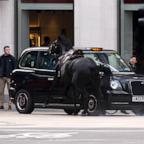Keep Steady Stock Portfolio Amid Crisis
N E W Y O R K, Oct. 9 -- After the third quarter stock market battering, investors might be tempted to cut their 401(k) account losses and put what's left of their nest eggs under their mattress.
But Good Morning America's financial contributor Mellody Hobson said investors should remember that retirement is the most long-term investment goal they will have. They can take comfort in knowing that all investors are in the same fix.
"I would recommend making very few changes to your portfolio given the recent economic backlash resulting from the tragedy," Hobson told Good Morning America. "Stay in stocks. Since 1926, stocks have consistently proven to be the best investment over the long-term. Your retirement funds are too important to move into cash and low-yielding bond funds."
Buy on the Way Down
Hobson suggested buying stocks while prices are low.
"None of us can predict when the market will hit its bottom, so the trick is to keep your wits about you and buy on the way down," said Hobson, who is president of Ariel Capital Management in Chicago. "It might be a good time to sock away more money into your 401(k) plan each month. If you buy quality stocks at their situational lows, they are bound to recover over the long-term."
Many shaken 401(k) investors are moving their assets to more conservative investments, such as money market accounts, but this could be to their detriment over the long-term, Hobson said.
According to a study conducted by the Employee Benefit Research Institute and the Investment Company Institute, the average 401(k) account was worth $58,774 at the end of the year in 2000, prior to 2001's disappointing year-to-date performance.
Making Up For Losses
Hobson used this average 401(k) account figure to explain how the current bear market impacts some average investors.
Here is one example: At the end of 2000, a 40-year-old man who had contributed $250 a month to his 401(k) plan with a balance of $58,000 would have $936,494 in 25 years when he cashed out his retirement portfolio. (Assuming a 10 percent average annual total return.) But, as of Sept. 30, the S&P 500 Index was down 20.39 percent for 2001, bringing the average 401(k) account balance down from $58,000 to $46,174.




